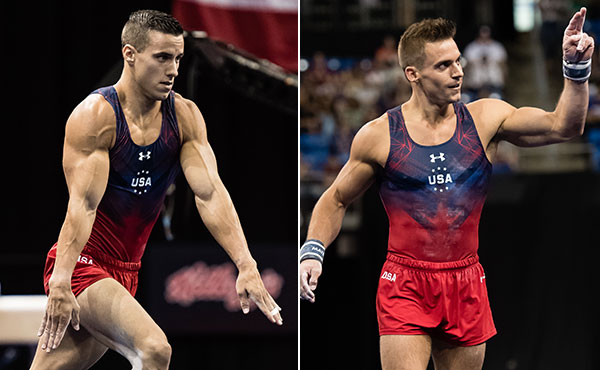
Frustrated and stuck at home, Jake Dalton couldn’t let the 2015 World Championships go by without taking a peek.
“OK,” he thought. “Maybe I’ll watch more than just a little.”
So as he set about recovering from a surgery that drained a cyst in his shoulder last fall, Dalton would flick on his TV at home in the morning in Oklahoma, then – after a quick run to the gym – put it on there, as well.
“It was really hard,” he said earlier this month in San Jose, where the 2016 U.S. men’s Olympic team had an open training. “I was trying to recover from an injury, but I also wanted to be out there competing with those guys. It motivates you to get back into the gym and work as hard as you can to get back out there.”
Dalton did just that: Gym, check in, gym, check in. It was both a painful and inspiring routine, and one that changed his approach to the 2016 season as a whole, with the Rio Games looming.
Hundreds of miles away in Colorado Springs, Sam Mikulak was going through much of the same process. His recovery from a fall ankle injury was not as far along as Dalton’s, but the forced time off – and missing the biggest international event the year before the Olympics – was a buoy in a variety of ways.
Give champions the spotlight and they soar, but give them darkness and it only makes them want to fly higher. And higher and higher.
“What’s happened in the past is in the past, you can’t change it,” Mikulak said in St. Louis after the men’s U.S. Olympic Trials. “All you can do is look towards the next day and make the most out of the moment that you’re in. We’ve been doing that. We have so much passion and drive going into this Olympics. We can’t control what happens in Rio, but we can control how we approach it and prepare.”
The approach – and preparation – has been carefully crafted for Team USA, but Dalton still savored his time away from the gym – and from competition in Glasgow, where the U.S. finished fifth without two of its most experienced leaders.
“It was a good mental break for me,” Dalton admitted. “I took time to rest, recover, get outside of the gym a little and when I was ready to get back into it, I wanted to jump back in. It was good. It was a blessing in disguise. I had more time to get everything back and get into full-gear training mode.”
He continued: “There were frustrating times, more when my shoulder felt like it wasn’t recovering as fast as I thought it would. Watching them compete (at Worlds), that definitely sucked. It felt weird to be all the way here when they were across the ocean at Worlds. You miss out on the fun bonding stuff as a team, as well.”
The American men have repeatedly said that they feel as close as ever as Rio itself has grown closer. Mikulak and Dalton, Olympic veterans, are joined by newcomers (but old timers) Alex Naddour and Chris Brooks, while their 2012 teammate Danell Leyva replaced John Orozco when Orozco tore his ACL – again.
That kind of team motivation is where they feel like they work their best, particularly Mikulak.
“I perform much better in a group and team atmosphere. Michigan taught me that, too,” Mikulak said. “At trials and nationals, it’s much different. We are putting our full hearts and efforts into the guys who are competing and we are trusting them in whatever event they’re on. That support system is something that stands out for us on the Olympic floor.”
Both men feel more confident this time around on the Olympic stage, now knowing how things play out from their collective London experience.
“I feel more comfortable this time,” Dalton said. “We have more experience and know what to expect. We have been in this situation and know what to do. It allows us to trust one another and trust the gymnastics I know that all of us can do.”
Mikulak feels like he has taken each situation, each scenario between London and Rio – including that time out last year during Worlds – and molded himself to be better.
“At 19, I didn’t have everything figured out,” he said. “I saw that I had more potential after the 2012 Olympics. I have a sense of urgency in the gym; I want to live up to this Olympic standard.”




